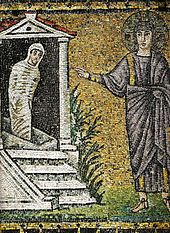Raising of Lazarus

The Raising of Lazarus or the Resurrection of Lazarus is one of the miracles of Jesus in the Gospels (John 11:1-46) in which Jesus brings Lazarus back to life four days after his burial in Bethany, near Jerusalem.[1][2]
Theologians Moloney and Harrington view the resurrection of Lazarus as a pivotal miracle which starts the chain of events that leads to the Crucifixion of Jesus. They consider it as a "resurrection that will lead to death", in that the resurrection of Lazarus will lead to the death of Jesus, the Son of God, in Jerusalem which will reveal the Glory of God.[3]
According to the Gospel of John, the sisters of Lazarus inform Jesus that Lazarus is ill, and seek help. But Jesus states:
"This sickness will not end in death. No, it is for God's glory so that God's Son may be glorified through it."
Jesus then delays his journey for two days. The disciples of Jesus are afraid of going back to Judea, but Jesus commands them to go with him, stating:
"Lazarus is dead, and for your sake I am glad I was not there, so that you may believe."
By the time they arrive in Bethany, Lazarus has been dead and buried for four days. Martha, a sister of Lazarus tells Jesus: "if you had been here, my brother would not have died", but Jesus assures her that her brother will rise again and states:

"I am the resurrection and the life. He who believes in me will live, even though he dies; and whoever lives and believes in me will never die. Do you believe this?"
Then Jesus said, "Did I not tell you that if you believed, you would see the glory of God?" So they took away the stone. Then Jesus looked up and said:
"Father, I thank you that you have heard me. I knew that you always hear me, but I said this for the benefit of the people standing here, that they may believe that you sent me."
When he had said this, Jesus called in a loud voice, "Lazarus, come out!" The dead man came out, his hands and feet wrapped with strips of linen, and a cloth around his face. Jesus said to them, "Take off the grave clothes and let him go."
The miracle of the raising of Lazarus, is the climax of John's "signs". It explains the crowds seeking Jesus on Palm Sunday, and leads directly to the decision of Caiaphas and the Sanhedrin to plan to kill Jesus.
See also
- Life of Jesus in the New Testament
- Ministry of Jesus
- Miracles of Jesus
- New Testament places associated with Jesus
- Parables of Jesus

